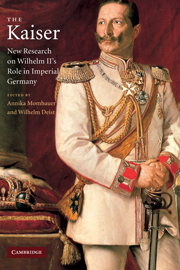Book contents
- Frontmatter
- Contents
- Notes on contributors
- Acknowledgements
- List of abbreviations
- Introduction
- Reflections on John Röhl: a Laudatio
- 1 Wilhelm II and ‘his’ navy, 1888–1918
- 2 Hollow-sounding jubilees: forms and effects of public self-display in Wilhelmine Germany
- 3 The Kaiser's elite? Wilhelm II and the Berlin administration, 1890–1914
- 4 Wilhelm, Waldersee, and the Boxer Rebellion
- 5 Dreams of a German Europe: Wilhelm II and the Treaty of Björkö of 1905
- 6 The uses of ‘friendship’. The ‘personal regime’ of Wilhelm II and Theodore Roosevelt, 1901–1909
- 7 Military diplomacy in a military monarchy? Wilhelm II's relations with the British service attachés in Berlin, 1903–1914
- 8 Wilhelm II as supreme warlord in the First World War
- 9 Germany's ‘last card’. Wilhelm II and the decision in favour of unrestricted submarine warfare in January 1917
- 10 Military culture, Wilhelm II, and the end of the monarchy in the First World War
- 11 Rathenau, Wilhelm II, and the perception of Wilhelminismus
- 12 Structure and agency in Wilhelmine Germany: the history of the German Empire – past, present, and future
- Index
6 - The uses of ‘friendship’. The ‘personal regime’ of Wilhelm II and Theodore Roosevelt, 1901–1909
Published online by Cambridge University Press: 24 July 2009
- Frontmatter
- Contents
- Notes on contributors
- Acknowledgements
- List of abbreviations
- Introduction
- Reflections on John Röhl: a Laudatio
- 1 Wilhelm II and ‘his’ navy, 1888–1918
- 2 Hollow-sounding jubilees: forms and effects of public self-display in Wilhelmine Germany
- 3 The Kaiser's elite? Wilhelm II and the Berlin administration, 1890–1914
- 4 Wilhelm, Waldersee, and the Boxer Rebellion
- 5 Dreams of a German Europe: Wilhelm II and the Treaty of Björkö of 1905
- 6 The uses of ‘friendship’. The ‘personal regime’ of Wilhelm II and Theodore Roosevelt, 1901–1909
- 7 Military diplomacy in a military monarchy? Wilhelm II's relations with the British service attachés in Berlin, 1903–1914
- 8 Wilhelm II as supreme warlord in the First World War
- 9 Germany's ‘last card’. Wilhelm II and the decision in favour of unrestricted submarine warfare in January 1917
- 10 Military culture, Wilhelm II, and the end of the monarchy in the First World War
- 11 Rathenau, Wilhelm II, and the perception of Wilhelminismus
- 12 Structure and agency in Wilhelmine Germany: the history of the German Empire – past, present, and future
- Index
Summary
‘Dynastic diplomacy’ had played an important role in German foreign policy ever since Wilhelm II had established his ‘personal regime’ during the 1890s. Since the Kaiser believed in the outstanding qualities of his personal diplomatic skills, he frantically tried to improve not only the Russo-German, but also the Anglo-German relationship through cultivating his contacts to his royal relatives in Russia and England. But these endeavours did not fall on fertile ground, since the ‘Royals’ in London and the Russian Tsar perceived them not only as troublesome and obstructive, but also as dishonest and manipulative. Too often foreign-policy performance and military preparations of the German Empire contradicted the Kaiser's verbal affirmations of friendship and goodwill.
It is much less well known that, in 1902, Wilhelm II also built up a personal relationship with Theodore Roosevelt, President of the United States since September 1901. This is remarkable because, while the Emperor's family ties easily explain his personal contacts with the ruling houses of Europe, Wilhelm II did not know Roosevelt personally until they met in May 1910, when the latter had already left office. Thus, the so-called Willy–Teddy relationship consisted of written communications and the verbal messages of the two men to each other, which were delivered through the German and American Ambassadors in Berlin and Washington as well as other emissaries chosen for such purposes.
Until now, only biographers of Theodore Roosevelt, but not of Wilhelm II have shown an interest in the relationship of the two men.
- Type
- Chapter
- Information
- The KaiserNew Research on Wilhelm II's Role in Imperial Germany, pp. 143 - 175Publisher: Cambridge University PressPrint publication year: 2003



